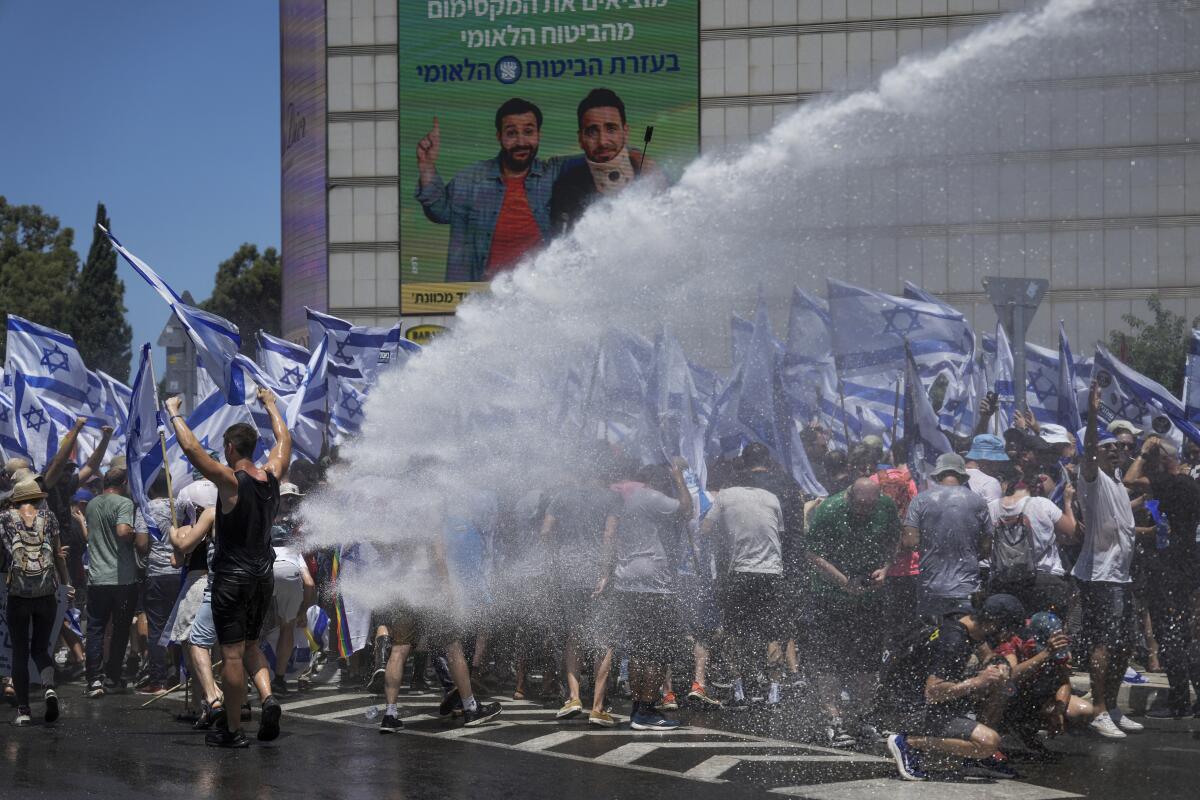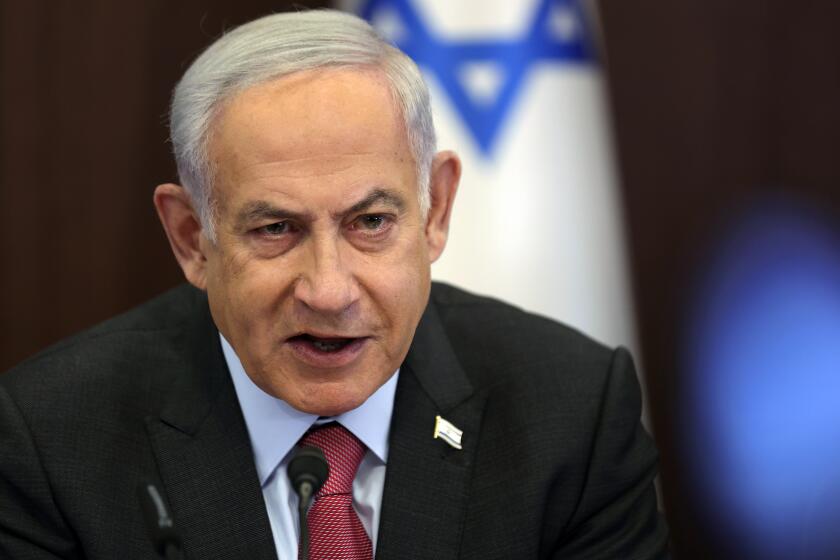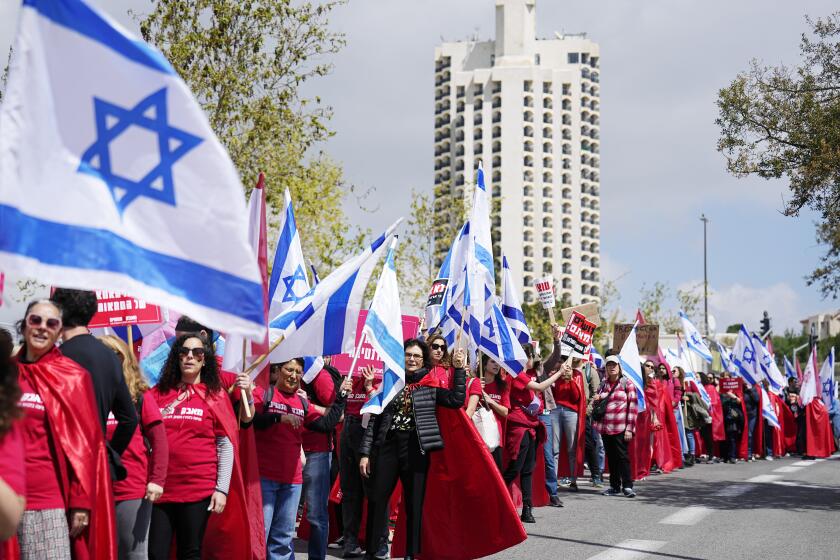Israelis block highways in protest of government’s plan to overhaul the judiciary

- Share via
JERUSALEM — Thousands of Israeli protesters took to the streets Tuesday, blocking major highways and thronging the country’s main international airport, in countrywide demonstrations against the government’s plan to overhaul the judicial system.
The demonstrations came the morning after Prime Minister Benjamin Netanyahu’s parliamentary coalition gave initial approval to a bill to limit the Supreme Court’s oversight powers, pressing forward with a plan that has bitterly divided the nation. Netanyahu’s ultranationalist and ultra-Orthodox allies have proposed a series of bills that have provoked months of sustained protests by opponents who say the country is being pushed toward authoritarian rule.
Anti-overhaul activists demonstrated throughout the day, including a protest in the afternoon at Ben Gurion International Airport. An estimated 10,000 people gathered outside the main hall, blowing horns and waving blue-and-white Israeli flags. Police kept the crowd from entering the hall, and travel was not disrupted.
“Civil war! I think we’re going that way if they’re not going to stop,” protester Adi Somech said.
Mass protests have taken place since Netanyahu’s far-right government presented the overhaul plan in January, days after taking office. The protests led Netanyahu to suspend the overhaul in March, but he decided to revive the plan last month after compromise talks with the political opposition collapsed. The parliamentary vote overnight Tuesday gave fresh momentum to the protest movement.
Prime Minister Benjamin Netanyahu rebuffs President Biden’s suggestion that he nix a planned judicial overhaul that has triggered massive protests.
Police used a water cannon to clear protesters who blocked a main artery leading to Jerusalem. Officers arrested several others who had obstructed a highway next to the central city of Modiin. Demonstrators blocked a main highway in Haifa with a large banner reading, “Together we will be victorious,” snarling traffic along the beachfront. A protest outside Netanyahu’s home in central Jerusalem was planned later Tuesday.
Police reported 66 arrests nationwide. Protesters scuffled with police in various locations, but no major violence was reported.
Netanyahu’s allies say the proposed changes are aimed at weakening the excessive powers of unelected judges.
The changes include giving the allies control over the appointment of judges and giving parliament power to overturn court decisions. The legislation advanced Tuesday aims to strip the Supreme Court of its power to review the “reasonability” of government decisions — a safeguard that proponents say is needed to prevent corruption and improper political appointments.
The Netanyahu government, which took office in December, is the most hard-line ultranationalist and ultra-Orthodox in Israel’s 75-year history. His allies proposed the sweeping changes to the judiciary after the country held its fifth elections in under four years, all of them seen as a referendum on Netanyahu’s fitness to serve as prime minister while on trial for corruption.
Israeli Prime Minister Benjamin Netanyahu says he wants to give himself and political opponents time to seek a compromise over judicial overhaul.
Critics of the judicial overhaul say it will upset the country’s fragile system of checks and balances and concentrate power in the hands of Netanyahu and his allies. They also say Netanyahu has a conflict of interest because he is on trial for charges of fraud, breach of trust and accepting bribes.
A wide section of society, including reserve military officers, business leaders, LGBTQ+ people and members of other minority groups, has joined the protests. The unrest has unnerved foreign investors and caused the currency, the shekel, to drop in value.
On Tuesday, 300 reservists from the military’s elite cyberwarfare unit signed a letter saying they would not volunteer for service, because the government has demonstrated “it is determined to destroy the state of Israel.”
“Sensitive cyber abilities with the potential for being used for evil must not be given to a criminal government that is undermining the foundations of democracy,” the letter said.
Fighter pilots and members of other elite units also have threatened to stop reporting for duty.
Arnon Bar-David, head of the country’s national labor union, the Histadrut, threatened a general strike that could paralyze the country’s economy.
“If the situation reaches an extreme, we will intervene and employ our strength,” Bar-David said, calling on Netanyahu to “stop the chaos.”
The Histadrut called a general strike in March as the government pushed the judicial overhaul legislation through parliament after weeks of protest. The move shut down large swaths of the economy and helped contribute to Netanyahu’s decision to suspend the legislation.
More to Read
Sign up for Essential California
The most important California stories and recommendations in your inbox every morning.
You may occasionally receive promotional content from the Los Angeles Times.












